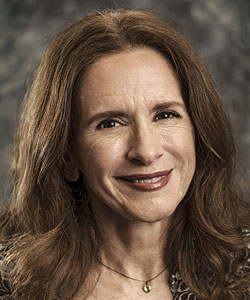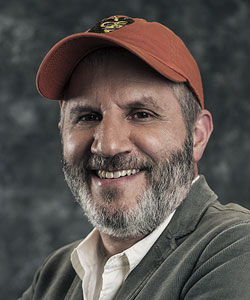Mark Levin and Jennifer Flackett know a thing or two—or more—about navigating writing partnerships.
Jordana Arkin reframes the question and offers up some do’s and don’ts.

Mark Levin and Jennifer Flackett know a thing or two—or more—about navigating writing partnerships.
Writing partners—and real-life partners—Mark Levin and Jennifer Flackett have been collaborating together for nearly 30 years, including co-creating the animated series Big Mouth (with Nick Kroll & Andrew Goldberg). With plenty of experience under their belts, the pair offer six tips for making the most of a writing partnership.
Question: How do you make writing partnerships work? What advice do you have for writing partners?
 Jennifer Flackett. Photo: Tom Keller
Jennifer Flackett. Photo: Tom KellerMark Levin & Jennifer Flackett: Writing can be lonely sometimes. Writing with a partner can be the antidote to that. We have loved being able to share Hollywood’s peaks and valleys over many years with someone whose creative journey is in exact alignment. It’s hard to overstate how comforting it is to leave a meeting with an exec and being able to ask, Did you hear her actually say that note was from her 9-year-old? Being able to laugh about the bad stuff takes away the pain surprisingly quickly.
 Mark Levin. Photo: Tom Keller
Mark Levin. Photo: Tom KellerWe have been collaborating for nearly 30 years—about as long as we’ve been married. We each had individual writing careers for a few years, but back then, when one of us stared into space distracted by their work, the other felt left out. So we took the leap of faith that we might be happier living in a shared imagination. Now, when one of us is staring blankly into space, the other can think to themselves, Oh good, I hope he’s solving that problem in the third act.
We must qualify any advice by noting that we are insane, wildly codependent outliers who prefer spending all their time together—we even share a single email address. And we know this is not for everyone. But in spite of us being such anomalies, here are a few things we’ve learned about making partnerships and collaboration work:
 You must be able to trust that you can tell your very worst ideas to your partner, and together you’re going to (hopefully) shape them into even better ideas.
You must be able to trust that you can tell your very worst ideas to your partner, and together you’re going to (hopefully) shape them into even better ideas.

Maybe a good writing partnership and a good marriage have more in common than we even realized. As we look back at our headlines here, it seems much of this advice could apply to both. For us, writing together blurs the line between work and play. Sharing one imagination has allowed us to make every day we work together into a conversation, a ping pong game, a drive up the coast. We’ve been very lucky to have a partner to share the journey with.
*Footnote: It’s the children who suffer most. A few years ago, our son instituted a strict “no talking about work” rule when we’re driving with him. But he’s at college now and we can talk about work whenever we want and there’s nothing he can do about it.
Mark and Jen have collaborated as writers, directors, and producers for decades. Their recent collaborations include co-creating Big Mouth and its spin-off Human Resources, and the screenplay for The Adam Project (written by Jonathan Tropper and T.S. Nowlin & Jennifer Flackett & Mark Levin) starring Ryan Reynolds. Read the 2019 Written By feature with Big Mouth co-creators Nick Kroll & Andrew Goldberg & Mark Levin & Jennifer Flackett.
Send us your questions about the craft, job hunting, your career, or Guild service (under 100 words, please) with the subject “Mentor,” and we’ll send them to an established screen or TV writer to answer. Questions might be edited for space or clarity and will be published anonymously. WGAW mentors provide informal career advice and are not expected to read scripts, give notes, hear pitches, or help find representation or work.
(This article originally appeared in the February 18, 2022 issue of the WGAW Connect newsletter)